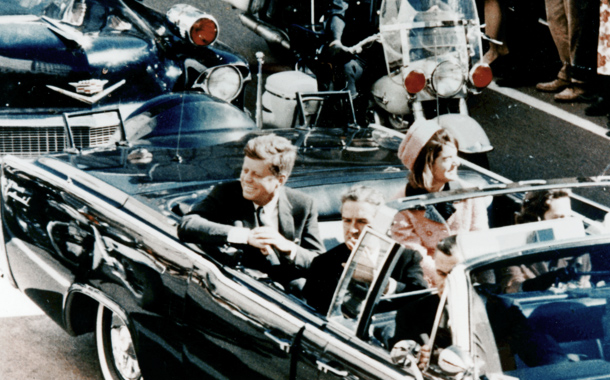<![CDATA[The assassination of President John F. Kennedy in Dallas in November 1963 has drawn the attention of conspiracy theorists from pretty much the moment the shots were fired. The scepticism felt by so many around the world reveals a great deal about attitudes towards American politics, and the growing cynicism towards the official accounts of major historic events. Fifty years ago, on the 24th September 1964, the Warren Commission released its findings on the Kennedy assassination. The report concluded that Kennedy's assassin Lee Harvey Oswald acted alone, and that Jack Ruby, the nightclub owner who killed Oswald in a Dallas police station, was also acting alone. The Warren Commission was specifically set up by Kennedy's successor, Lyndon B. Johnson, to reassure the American public that the assassination was not part of a wider political conspiracy. The Commission was named after its leader, Supreme Court Chief Justice Earl Warren. Working alongside him on the commission were future US President Gerald Ford, Allen Dulles, the former head of the CIA who was fired by Kennedy after the Bay of Pigs incident, and former president of the World Bank, John J. McCloy. The Commission also included several US senators - Hale Boggs, Richard Russell Jr. and John Sherman Cooper. Lee Harvey Oswald's strange personal history was directly addressed by the commission. Oswald had migrated to the Soviet Union, and then returned to the US using State Department funding. He had previously been investigated by the FBI, and started a branch of the Fair Play for Cuba Committee in New Orleans - a grassroots organisation that campaigned against armed US intervention in the Cuban Revolution. Perhaps most unusually, Oswald had been hired by the Texas Book Depository (the building from where he shot the President) one month before Kennedy's visit to Dallas, and before the route for the President's motorcade had been made public. The commission concluded that nothing in Oswald's biography pointed to a conspiracy. It also dealt with the forensic evidence suggesting there had been more than one gunman, and concluded that Oswald was the only shooter. The report ruled out any kind of conspiracy, whether foreign or domestic. It concluded that one of the most powerful men on the planet was slain by a troubled young man working alone, using nothing more than a $21, mail order assault rifle. Despite the report, by the late sixties opinion polls showed that many Americans still believed an element of conspiracy was involved in Kennedy's death. An April 2013 poll by the Associated Press revealed that 59% of Americans still believed some kind of conspiracy had been at play in the assassination. The fact that an official investigation backed by the government, and involving members from both of the two biggest US political parties, still could not allay conspiracy theorists, tells us a great deal about the lack of trust many had and still have in political systems. After the sixties, the US was blighted by political controversy. The Watergate Scandal, the Vietnam War and other national tragedies seem to have made Americans incredibly reluctant to trust their government, something that was demonstrated again in the popularity of September 11th conspiracy theories. Indeed, people even question the validity of the moon landing. The theories relating to Kennedy's death often revolve around outside powers being at play, from the powerful US arms industry to Fidel Castro and Cuban Revolutionaries. This fear of clandestine forces shaping history is also apparent in other conspiracy theories around the world, most explicitly in the idea that the planet is run by the 'Illuminati'. Conspiracy theories, such as those surrounding the Kennedy assassination, reveal a growing cynicism of the political system and loss of faith in the honesty of public figures. On the other hand, they could also point to the inability of human nature to accept the chaotic nature of existence, with a need to put even random acts of evil into an institutionalised framework. Kennedy's death may have been the act of a complicated domestic or foreign conspiracy, we will probably never know. The fact so many find it so hard to accept the possibility that it was just the actions of a single disturbed young man however, reveals a great deal about the ways in which we process the world around us. ]]>
The Warren Commission Fifty Years On
